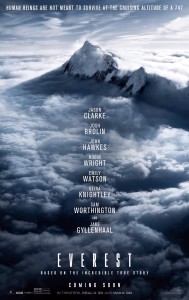 Based on a true story, Baltasar Kormakur’s (2 Guns, Contraband) new adventure drama Everest chronicles the 1996 journey of two expeditions aiming to reach the summit of Mount Everest. The only problem is that both groups must battle some of the harshest snowstorms during their climb, testing the limits of both their bodies and minds. The film focuses predominantly on climber and Adventure Consultants owner Rob Hall’s (Jason Clarke) expedition, a man known for safety and reliability while tackling the most intense climb people will likely go on in their lives.
Based on a true story, Baltasar Kormakur’s (2 Guns, Contraband) new adventure drama Everest chronicles the 1996 journey of two expeditions aiming to reach the summit of Mount Everest. The only problem is that both groups must battle some of the harshest snowstorms during their climb, testing the limits of both their bodies and minds. The film focuses predominantly on climber and Adventure Consultants owner Rob Hall’s (Jason Clarke) expedition, a man known for safety and reliability while tackling the most intense climb people will likely go on in their lives.
Featuring a stellar cast comprised of Jason Clarke, Josh Brolin, John Hawkes, Robin Wright, Emily Watson, Keira Knightley and Jake Gyllenhaal, Everest sets out to remind us why we should never take nature and its power for granted. This is a movie that may take you on an emotional rollercoaster ride pending on how engaged you get with the film. It’s also a movie that is fairly, but not entirely, predictable. Thankfully, some pretty good acting is able to make up for other areas that aren’t as strong (though it was hard to watch Jake Gyllenhaal in such a small role, felt like a waste of talent).
Climbing films tend to follow a standard trajectory and this is no different, but thanks to the aforementioned good acting, beautiful cinematography and some brutal scenes that’ll make you question why people do this for sport, Everest is able to succeed even with its lack of originality.
I always enjoy climbing films so maybe I’m biased, but it’s hard not to pull for people that are willing to put their lives on the line for a dream. Sure, some are more stupid than others, some live that probably shouldn’t, but that’s the nature of life and that’s what Everest makes perfectly clear. We get to learn enough about each character that we somehow manage to become invested in them and their success. When you watch a survival movie such as this, that’s one of the most important elements to focus on and I think Kormakur did a good job emphasizing it.
As for a technical element of the film, while I hate 3D, I thought there was a chance it would really help enhance the film’s wintery climate, snow fluttering in front of your face, that sort of thing, but I honestly didn’t notice it at all while watching the movie. Maye that’s good, it blended in well, or maybe that’s bad because it didn’t leave an impression. It means that the snow didn’t stand out, the depth didn’t stand out and in the end all I’m left remembering is that the bright blues and whites on screen were darkened because of stupid 3D glasses. What I’m saying is skip the 3D element if possible.
Overall, I enjoyed Everest. I may be biased because I love extreme sports and challenging the human body, but I also think that despite a storyline that you can mostly predict from the get-go, it was hard not to become engaged with the film. There were likable characters, brutal challenges to overcome, and life threatening moments with major consequences that makes you re-think what you’re doing with your boring life or makes you glad that you’re not into that sort of thing.

















Recent Comments